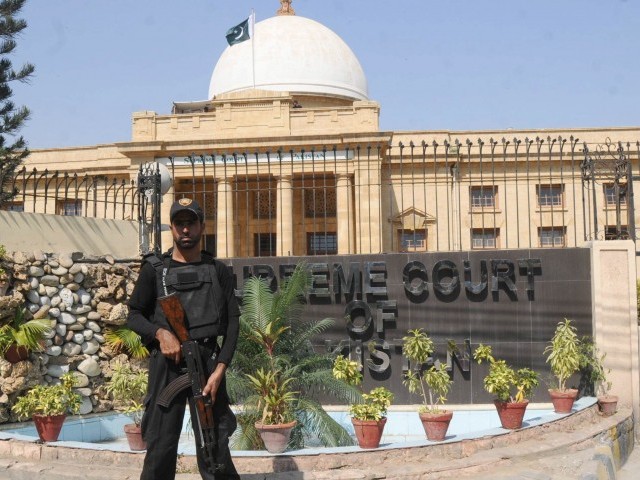
The Supreme Court ordered the authorities concerned on Thursday to remove encroachment at all the state-owned as well as private buildings within three days, saying that closing or blocking roads in the name of security or for any other reason was illegal.
During the hearing of an encroachment-related case at the apex court’s Karachi Registry, Chief Justice Qazi Faiz Isa remarked that if the high-ups felt any threat to their security, they should relocate themselves to a remote and secure place, rather than creating difficulties for the general public.
A three-member bench, led by Chief Justice Isa and including Justice Jamal Khan Mandokhel and Justice Naeem Akhtar Afghan, heard the petition by the people affected by the Karachi Circular Railway (KCR). The chief justice ordered the authorities to look into the matter brought forth by the petitioners.
“People continue to face attacks and you stay protected, what law is this,” the chief justice remarked during his conversation with the Sindh advocate general, who had mentioned that there were security issues as bomb blasts had happened there.
“If you feel too scared, go to a remote area and sit there but don’t block roads in the name of security,” the chief justice remarked. “No one should be allowed to obstruct the free movement of people. It is illegal to block roads and create obstructions.”
Justice Mandokhel remarked that the judges were in more danger, because the authorities catch terrorists but “we give them the death penalty”. The chief justice pointed out that before he came, the road in front of the Supreme Court Registry was blocked but he ordered for its opening.
Read Road encroachments block traffic
The chief justice then mentioned the Rangers headquarters, located in the Jinnah Court, a building just a few hundred metres away from the Supreme Court Karachi Registry. “Tell me where is the Rangers headquarters and where is the footpath [of the road in front of it],” he asked.
The chief justice told the advocate general to inform the court that under which law the Jinnah Court building was given to the Rangers. He also said that Naval Headquarters, Governor’s House, Chief Minister House, Rangers Headquarters all have occupied footpaths.
The federal and the provincial governments themselves were making encroachments, Chief Justice Isa observed. “Does this happen anywhere else in the world,” he asked. While referring to the presence of the mayor of Karachi, he remarked that the city roads were broken at places.
He also mentioned the placing of containers on roads. “Why containers are kept outside the Governor’s House, place them inside,” he remarked. “Do the things that do not disturb people,” he continued. “We say that if there is an encroachment in front of the Supreme Court, remove it, too.”
Chief Justice Isa then told the lawyer for the Karachi Metropolitan Corporation (KMC) that they had demolished the [illegal] homes of ordinary people, but “why don’t you remove the encroachment in front of the Rangers headquarters”.
The chief justice ordered the KMC to remove the encroachments, adding that the expenses incurred on removing the obstructions would be recovered by the KMC from the head of the concerned institution. Later, the court ordered for the removal of barricades outside all government and private buildings.
The court sought a report within three days. The court directed the additional attorney general to inform the federal agencies about the order for removal of encroachments and send a copy of the court orders to all and security agencies concerned.














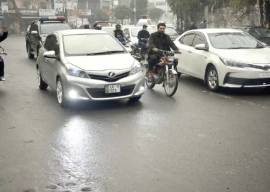
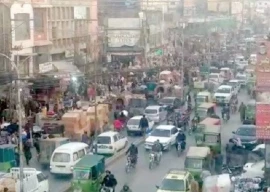

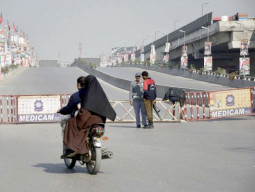

1713904359-0/burn-(1)1713904359-0-270x192.webp)



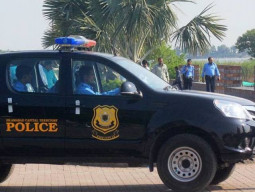
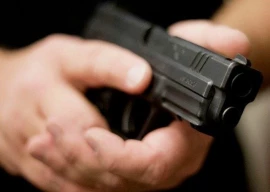











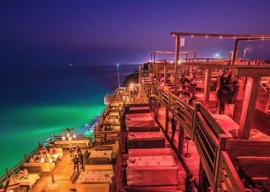









COMMENTS
Comments are moderated and generally will be posted if they are on-topic and not abusive.
For more information, please see our Comments FAQ